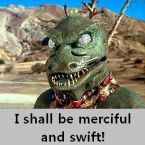CT Grognard
Posts: 694
Joined: 5/16/2010
From: Cape Town, South Africa
Status: offline

|
The earliest attestations of the word grogner in French are from around 1300, one is in a Cambridge University manuscript ("Tut a primes I comant [...] Al vilein jelos groinert / Mes angoisse e la hart").
The source of the French verb grogner ("to snarl"/"to grunt"/"to growl"/"to grumble") (Anglo-Norman groigner) is the Latin grunnire, "to grumble", which is related to the Germanic word-stem that gives you words like the English grunt or German grunzen, i.e. the sound made by pigs.
The noun, grognard, then, referred to someone who grumbled, i.e., a grumbler. (Wargamers, grumble about anything? Never!)
The French Vielle Garde, or Old Guard, were the elite veteran elements of Napoleon's Imperial Guard. As such, it was the most prestigious formation in Napoleon's Grande Armée. Members of the Imperial Guard had a number of benefits, one being considerably higher wages than any other military unit. Another privilege reserved only for members of the Old Guard was the freedom to express their discontent freely, i.e. the Old Guard was allowed to grumble openly! The Old Guard Grenadiers came to be known as "les Grognards" because they openly complained about all the petty troubles of military life.
Therefore, in French, "grognard" refers to an old veteran soldier; especially an old complaining soldier that is a veteran of the grenadiers of the Imperial Guard.
The word "grognard" began being used in England around the 1840s to refer to an old soldier.
The term first began to be applied to veteran wargamers back in the early 1970s. It was coined by John Young, who was, at the time, an employee for New York-based Simulations Publications, Inc. (SPI), at the time an influential publisher of board wargames. SPI had a flagship magazine called "Strategy & Tactics", which had started as a wargaming fanzine but under SPI became more of a military history magazine that included a wargame.
SPI's most successful wargame at the time? Napoleon at Waterloo. Young is said to have compared the grumbling and complaining by players of SPI's boardgames to the legendary grumbling by Les Grognards. His use of the term to describe SPI's wargamer clients around the office (and among the local playtesters) soon led to "grognards" being mentioned in an edition of Strategy & Tactics.
A few hundred thousand board wargames picked up the term from the magazine, and it later spread to computer wargamers, since the board wargamers were the first people to play computer wargames when they appeared (these tended to be PC conversions of existing board wargames anyway).
I hope that was interesting. Now, grumble away!
|
 Printable Version
Printable Version










 New Messages
New Messages No New Messages
No New Messages Hot Topic w/ New Messages
Hot Topic w/ New Messages Hot Topic w/o New Messages
Hot Topic w/o New Messages Locked w/ New Messages
Locked w/ New Messages Locked w/o New Messages
Locked w/o New Messages Post New Thread
Post New Thread